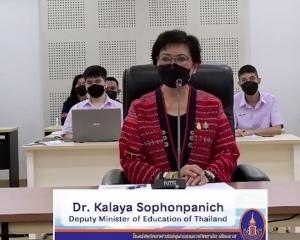Does the education system really need another major overhaul? David McKenzie, of Dunedin, urges a more cautious approach.
Dr Cathy Wylie (ODT, 27.12.12) calls for yet another radical reform of the education system in New Zealand.
Her views are important because Dr Wylie is a person who possesses an almost unrivalled knowledge of how schools throughout this country actually work.
She concludes that the reforms of the 1980s, which identified the self-managing school as the central unit of administration, need now to be modified by adding regional authorities, which would also be represented at the senior level in the Ministry of Education.
In this way, Dr Wylie argues, schools which are now isolated from one another (and each competing with one another, in fact) would be encouraged to co-operate in building and sharing knowledge about teaching and learning.
She notes that, in a given year, 20% of the schools are not at present managing well. In large part I sympathise with Dr Wylie's analysis, but I am not persuaded that the reforms which she urges are the right way to proceed.
The model of the self-managing school which was introduced by the Picot reforms is, as Dr Wylie notes, pretty much unique in the world.
But it grew out of a long tradition of ''localism'' in New Zealand education and I fear that if boards of trustees were now to have their powers seriously eroded, fewer people would want to devote their time and energy to this kind of work.
One way forward could be for the Government to encourage those boards of trustees which are willing, to amalgamate and look after several schools.
This is possible under present legislation and has plenty of precedents.
Many Dunedin people will remember, for example, a time when several leading secondary schools in the city were governed by a single board. Clearly, Dr Wylie also has serious doubts about the way in which school principals are appointed. I agree with her that it is timely to review these procedures, which should be professionally robust and avoid extreme parochialism.
But a word of warning from our education history.
Any reform which effectively gives appointment powers to an outside authority is most likely to accelerate a flood of departing members from boards of trustees who want something more to do than run the chocolate wheel at school fairs.
Here, as in so many things, it is a fine line which must be trod.
Dr Wylie's major burden of complaint is that the decision in the 1980s to create a Ministry of Education that would not work alongside schools has created a vacuum in professional leadership which now desperately needs to be filled.
I believe that she is right.
But my preference would be to use the ministry's present regional offices to do all the things that she considers needful.
Of course, a government of the day does not have to heed the advice of its officials, but at least advice which draws upon knowledge of what is happening in the respective regions stands a better chance of being convincing than does advice based upon poring over spreadsheets of national test data which, not to put too fine a point on it, are presently of very dubious value.
For most of the 20th century, the former Department of Education built up a successful and progressive system of education through its professional leadership.
I see no obvious reason why this tradition could not now be called upon once more.
- David McKenzie is a former associate professor of education at the University of Otago.











